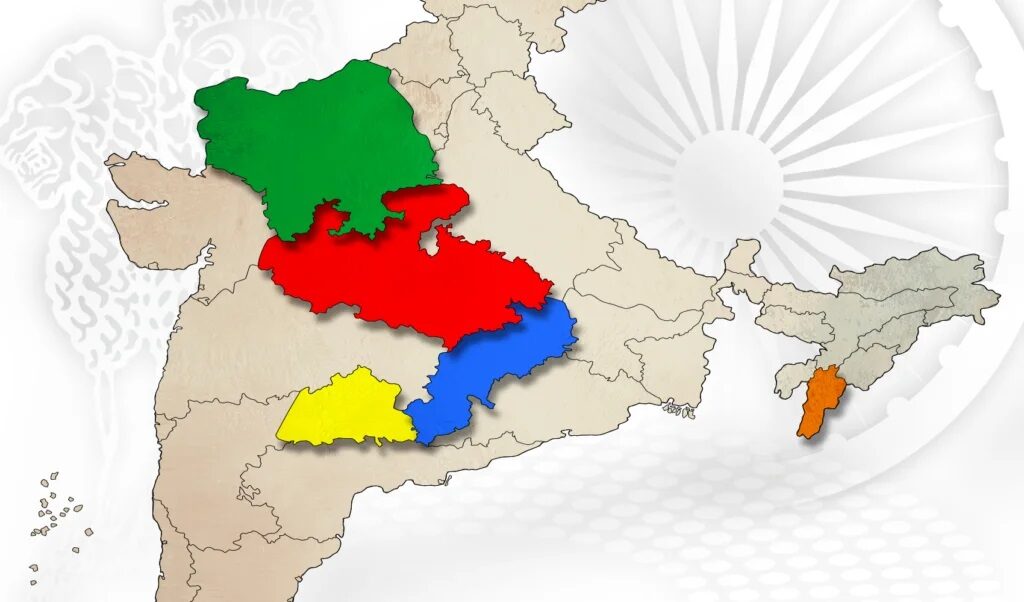State Elections Will Shape India’s Mood For ’24
Nov 28, 2023 | Pratirodh Bureau
Rajasthan, Madhya Pradesh, Chhattisgarh, Telangana and Mizoram are the last states to head to the polls before the general election in 2024 (Michael Joiner, 360info CCBY4.0)
The legislative elections in five states of India – Rajasthan, Madhya Pradesh, Chhattisgarh, Telangana and Mizoram – are the last set of polls before the general election scheduled for April 2024.
While the results of the general election do not always match the state elections, their outcome will nevertheless have a psychological impact on Indian political parties and Indian voters.
These elections will also help the parties finalise their agendas for 2024 by fine-tuning which issues work or don’t work with voters.
Since the ruling Bharatiya Janata Party (BJP) has projected Prime Minister Narendra Modi over the local leaders from the election-going states, political observers will keenly watch whether his electoral magic – a mix of demagoguery and ideological rhetoric – is still effective.
That it has a government ruling at the Centre is an advantage for the BJP, whose campaign centres around its unapologetic Hindu nationalism, plus its welfare schemes and ‘freebies’. All of these – the free food distribution scheme for the poor, the subsidised cooking gas cylinders, the cash doles to women and the poor – are presented as Modi’s personal largesse.
The Congress party’s campaign promises a caste census, which would guide the distribution of entitlements in proportion to a caste’s size in the population. The party also offers competitive freebies as ‘guarantees’ similar to the BJP, as well as farm loan waivers and unemployment dole for youth.
The promise of returning to the Old Pension Scheme (OPS) is also a key campaign plank of the Congress. The OPS guaranteed half the last basic salary drawn as pension for government employees, unlike the entirely employee-financed and purely voluntary New Pension Scheme, which was introduced by a BJP government at the Centre in 2003.
These populist welfare measures are bound to affect the already precarious finances of the election-going states, irrespective of which party comes to power. They will also have a knock-on effect on the finances of the Central government. However, none of the political parties seem concerned by this reality.
The state elections have been highly centralised for the BJP, with Modi and his Home Minister Amit Shah having the final say on candidate selection to the campaign agenda in each state. The BJP’s relegation of state leaders to the background is seen by many as an unnecessary risk – should the party lose in these states, Modi will have to take the blame. Victory, no doubt, will go only to Modi’s account.
Just as the state elections can prove a turning point for the BJP, they are also an acid test for the leadership of Rahul Gandhi, the scion of the Gandhi dynasty that rules the Congress party. His image and his political vision seem to have gained considerably from his 146-day, 4,080km ‘walkathon’ across the country.
After the Congress victory in the state of Karnataka in May this year, Gandhi seems supercharged to take on the BJP’s “divisive politics”. The party organisation also seems more confident after holding internal elections and rebooting its election machinery.
A win in a majority of these states will act as a great pick-me-up for the party and boost Gandhi’s confidence in working with a united opposition against Modi in the 2024 general election. A defeat would result in renewed doubts about his ability to lead the party to electoral victory.
The results to be announced on 3 December, therefore, will critically shape the mood of the nation in the run-up to the general election.
(Originally published under Creative Commons by 360info™. Read the original article here)
